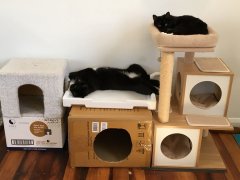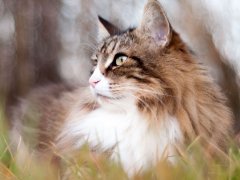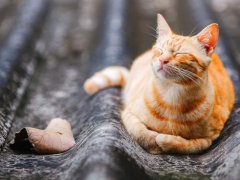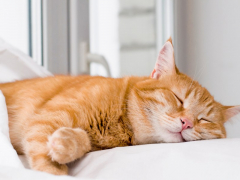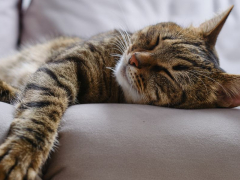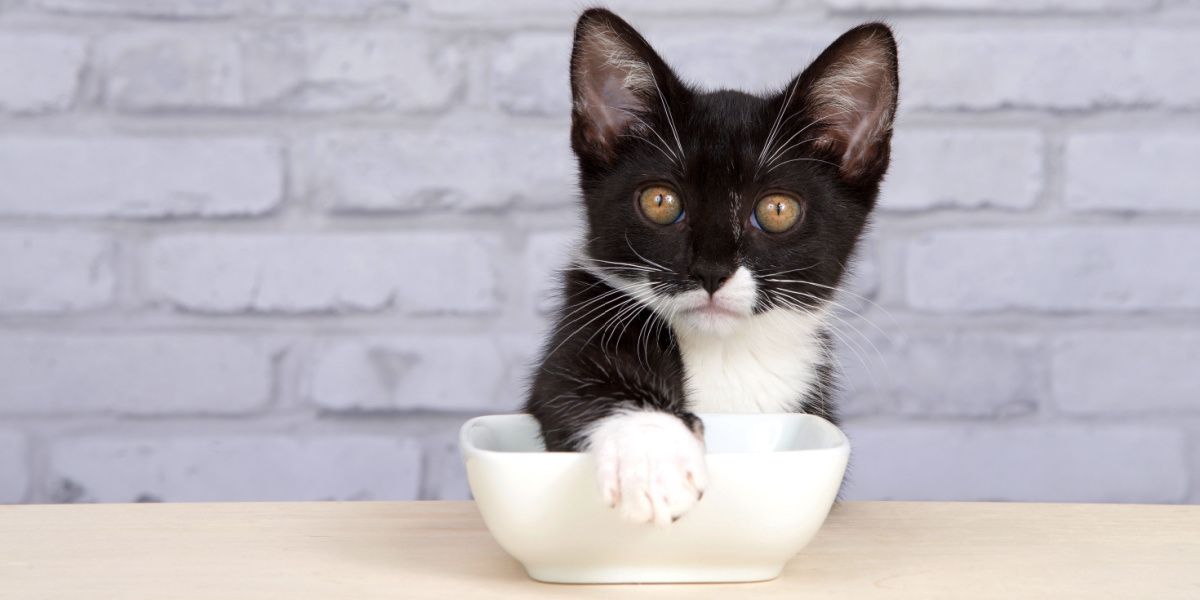
Sheila Fitzgerald / Shutterstock.com
There is no arguing with the fact that cats tend to have quirky habits. Among the many that perplex cat owners is when cats cover their food.
You may have noticed your cat scratching and pawing at the floor around their food bowl. Or you may have even found them covering their leftovers with a towel, blanket, or sheet of paper. Thankfully, this is normal feline behavior. It is typically driven by natural instincts inherited from their wild ancestors.
Key Takeaways
Cats may cover their food as an instinctive behavior passed on to them by their wild ancestors.
Although covering food is normal cat behavior, it can become a problem if they are making a mess in the house or damaging floors with their claws.
In some cases, a cat covering their food is a sign of anxiety and could signal something deeper is wrong.
Occasionally this food-covering behavior is a sign of stress or anxiety, loss of appetite, or an issue with the food itself. In this article, we will explain the roots of this quirky cat behavior, how to discourage it when necessary, and when you should seek the advice of your veterinarian.
Causes of Food Burying in Cats
So, why do cats scratch around their food bowls, scraping their paws like they do in the litter box? They are actually trying to bury their food, using a similar action they use to cover their toileting deposits. But why? Here are some possibilities:
1. Instinctive Behavior
The reasons why many cats try to bury their food can be traced back to their wild ancestors. Many of these ancient instincts are still within our pet cats. Domestic cats are part of the Felidae family, which contains 37 recognized species. They likely evolved from a common Asian ancestor 10 to 12 million years ago.
The Felidae family also includes big cats like lions, tigers, leopards, and cheetahs, as well as several species of wild cats. Samples of DNA from pet cats across the world are almost identical to African wildcats. Our domestic house cats also share over 95% of their DNA with tigers.
Wild cats may cover and hide the remains of their meals for several reasons:
- Covering their tracks: Many smaller species of wild cats are prey themselves. Burying food may be an attempt to cover the scent of their meals to try and avoid detection by predators.
- Avoiding detection: Several wild cat species may try to cover the scent of their leftover food to avoid alerting more dominant or aggressive cats to their presence.
- Protecting their offspring: Cats nursing and feeding their young are restricted in their movement and territories. Burying food to cover its scent draws less attention to them, and helps to keep their family safe.
- Avoiding scavengers: Wild cats may cover food in an attempt to hide the smell from scavengers such as hyenas and vultures so they don’t lose their hard-earned meal. Our domestic cats may view other household pets as potential scavengers too, and try to bury the food to stop them from pinching it.
- Food caching: Caching describes the relocation or storage of food to protect it from competitors, preserve it, or ‘save it for later.’ Caching behavior is more commonly displayed by big cats that hunt large prey that cannot always be eaten in one sitting. It has also been documented by scientists in European wildcats, a close relative of our domestic feline companions. This survival instinct may make our domestic cats try to bury their food simply because there is too much to eat in one go.
- Food preservation: Burying food may help to preserve carcasses by keeping them out of the hot sun.
These shared instincts mean that even though most of our thoroughly loved and pampered cats have no danger of missing their next meal or losing it to a scavenger, food burying is a common and completely normal behavior in our pets.
2. Maintaining a Clean Living Area
Most cats are fastidiously clean. They can spend hours of the day grooming themselves. They also typically use the litter box without any training.
This means they appreciate a clean living area too. Trying to cover uneaten food may be their way of maintaining this. Old food can be a source of mold and diseases and can attract unwanted attention from other animals.
Can Covering Food Indicate a Serious Problem?

Cats share some of the same instincts as their wild ancestors, which may explain why they cover their food. Kirsten McCarthy / Cats.com
Although most cats that cover their food are acting on normal instincts, there are rarer instances where the behavior is a sign of a problem:
- Stress and anxiety: Stress is especially important to consider in a multi-cat household. A cat that is worried about competition or altercations with other cats over meals will sometimes cover their food.
- Inappetence: Cats with poor appetites due to health issues may go off their food and attempt to cover it over, especially if they are feeling nauseous. Book a check-up with their vet if they are eating less, and uncharacteristically burying their food.
- Fussy eater: It may be that your cat has just gone off the food. Give them a small amount of a different food or flavor to see how they respond.
- Spoiled food: If your cat suddenly starts trying to bury their food rather than tucking in as usual, check the expiration date, and that there are no signs of it being moldy or rancid.
Do I Need to Stop My Cat From Trying to Cover Their Food?

There are a number of steps owners can take to stop their cats from covering their food. Kirsten McCarthy / Cats.com
As covering their food is a normal behavior in many cats, there is no need to be concerned if they seem otherwise well. Sometimes it can be a nuisance for cat owners if it makes a mess, and if sharp claws are causing damage to the surrounding floor. Never punish your cat; this will just scare and confuse them, and the resulting stress and anxiety may cause other problems such as house soiling.
What You Can Do To Stop Your Cat From Covering Their Food
The following suggestions may help stop your cat from trying to bury their food:
- Feed smaller portions: This makes it less likely that there are leftovers to trigger the instinct to cover them. Ensure you are still feeding enough food overall to keep your cat at a healthy and stable weight.
- Use an automatic feeder: This makes it easier to feed several smaller meals throughout the day.
- Remove bowls after eating: This will not be practical for all cat owners due to their schedules. However, if you are around when your cat is eating, take away the bowl as soon as they have finished. This will prevent them from trying to bury the leftovers.
- Use distraction: Using puzzle feeders and toys as distraction may help to stop your cat from feeling the need to bury their food.
- Protective feeding mat: Protect precious floor coverings and carpets from your cats’ sharp claws with a feeding mat.
- Feeding schedules: Stick to predictable feeding schedules so your cat doesn’t feel the need to hide food for later. This is especially true for pregnant and nursing queens where this instinct will be strong.
- Separate feeding in multi-cat households: Cats feel secure when eating in peace. Separate eating areas in a multi-cat home. This helps decrease their instinct to cover food to avoid it being taken by another household pet.
Your cat is most likely led by their natural instincts to bury their food, just as their wild ancestors did, even if their doing so is a bit of a nuisance. However, if your cat is showing any signs of illness or distress along with a change in their normal behavior, you should always consult their veterinarian.
Frequently Asked Questions
Why is my cat burying their food and not eating it?
If your cat has already eaten a substantial portion of food before starting to bury it, it is possible that their portion sizes are too large, and their natural instincts to hide the food have been triggered.
If your cat is not eating any food at all you should check the food is not spoiled and try to tempt them with an alternative food. If they still refuse to eat, take them to the veterinarian in case they are unwell.
Why does my cat scratch the floor around their food?
Our domestic cats retain many instincts from their wild ancestors, including attempting to bury leftover food. Even if there is nothing in our houses that they can actually bury food in, many cats will scratch and paw at the ground around their food bowls due to these survival instincts.
How can I stop my cat trying to cover their food?
Although trying to bury their food is normal behavior in most cats, it can be frustrating if they are making a mess, or damaging your floors. Some tips to help include feeding smaller portions to avoid leftovers, picking up bowls as soon as your cat has finished eating, and using feeding mats to protect your floors.
-
Cho, Y., Hu, L., Hou, H. et al. (2013). The tiger genome and comparative analysis with lion and snow leopard genomes. Nat. Commun 4, 2433
-
Driscall, C.A., Menotti-Raymond, M, et al. (2007). The Near Eastern Origin of Cat Domestication. Science 317(5837):519-523
-
Ruiz-Villar, H., Lopez-Bao, J.E., Palomares, F. (2020). A small cat saving food for later: caching behavior in the European wildcat (Felis silvestris silvestris).

